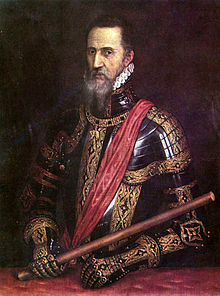1507 Birth of a brutal duke
Fernando Álvarez de Toledo y Pimentel, Duke of Alva (or Alba) (1507-82) was an illustrious Spanish general during the many wars waged by King Charles I (known better as Charles V of the Holy Roman Empire) and his son Philip II. He won victories against the corsair pirates of the Barbary Coast, rebellious Dutch Protestants and rebellious German Protestant princes. Of him Chamber’s Book of Days says:
This great general of the Imperial army and Minister of State of Charles V, was educated both for the field and the cabinet, though he owed his promotion in the former service rather to the caprice than the perception of his sovereign, who promoted him to the first rank in the army more as a mark of favour than from any consideration of his military talents. He was undoubtedly the ablest general of his age. He was principally distinguished for his skill and prudence in choosing his positions, and for maintaining strict discipline in his troops. He often obtained, by patient stratagem, those advantages which would have been thrown away or dearly acquired by a precipitate encounter with the enemy. On the Emperor wishing to know his opinion about attacking the Turks, he advised him rather to build them a golden bridge than offer them a decisive battle. Being at Cologne, and avoiding, as he always did, an engagement with the Dutch troops, the Archbishop urged him to fight. ‘The object of a general,’ answered the Duke, ‘is not to fight, but to conquer; he fights enough who obtains the victory.’ During a career of so many years, he never lost a battle.
While we admire the astute commander, we can never hear the name of Alva without horror for the cruelties of which he was guilty in his endeavours to preserve the Low Countries for Spain. During his government in Holland, he is reckoned to have put 18,000 of the citizens to death. Such were the extremities to which fanaticism could carry men generally not deficient in estimable qualities, during the great controversies which rose in Europe in the sixteenth and seventeenth centuries.
Pieter Brueghel’s masterpiece “The Massacre of the Innocents” sets Herod’s Biblical slaughter of the boy babies of Bethlehem in a Dutch village overrun by Spanish troops. The black-armoured figure on horse-back is said to be based on the Duke of Alva.
